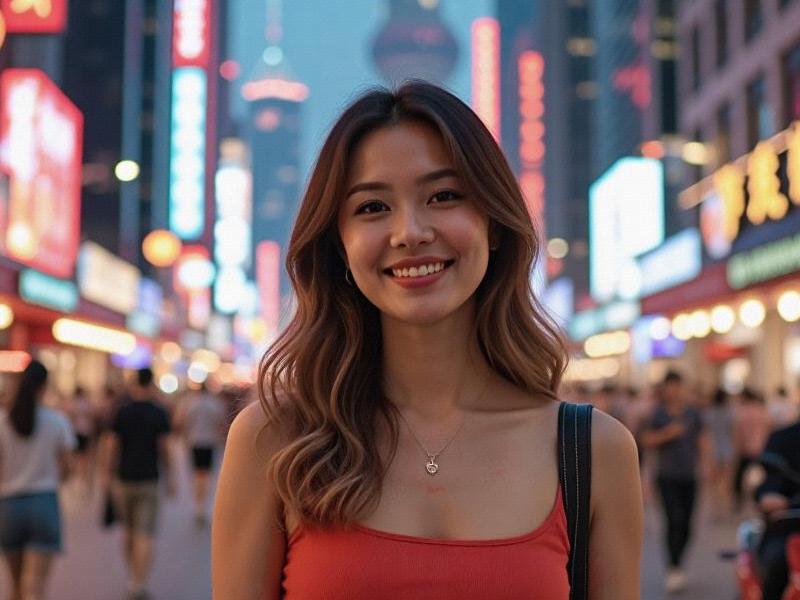This comprehensive analysis explores how Shanghai women are redefining feminine success through cultural preservation, educational attainment, and technological innovation, creating a new paradigm of urban femininity in China’s global gateway city.

Redesigning Heritage: The Qipao Revolution
In a restored 1930s shikumen mansion on Julu Road, 34-year-old designer Liang Yuxi showcases qipaos embedded with nanotechnology. Her "Smart Silk" collection features dresses that change patterns through smartphone apps while maintaining 1920s tailoring techniques. "We integrate RFID chips in mandarin buttons to tell garment histories," explains Liang, whose clients include tech CEOs and cultural ambassadors. The Shanghai Silk Association reports a 62% increase in luxury qipao sales since 2022, with average prices reaching ¥18,000.
The Education Advantage
Fudan University’s 2024 gender study reveals 73% of Shanghai women aged 25-40 hold postgraduate degrees – triple the national average. Dr. Wang Xinyi, lead researcher, notes: "Our data shows Shanghai females outperform males in STEM fields, comprising 58% of AI professionals under 35." At the Shanghai Women’s Innovation Hub, 28-year-old robotics engineer Chen Wei develops exoskeletons for elderly care while preserving her grandmother’s Jiangnan embroidery techniques through digital archiving projects.
Economic Power Players
上海龙凤419油压论坛 Shanghai’s female-led startups now account for 41% of venture capital deals in the Yangtze Delta. Beauty-tech pioneer Zhang Lulu, 37, recently secured ¥200 million funding for her AI skin analysis platform combining TCM diagnostics with big data. "Our devices analyze 148 facial points against Shanghai’s unique humidity and pollution levels," Zhang explains. The municipal government reports women lead 68% of registered high-tech enterprises in Pudong’s Zhangjiang Park.
Cultural Fusion in Practice
Xuhui District’s "Memory & Future Café" epitomizes Shanghai’s blended identity. Owner Song Meihui, 31, serves chrysanthemum-infused cold brew in porcelain cups styled after 1930s opium lamps. Monthly events feature Jewish refugee poetry readings alongside Suzhou pingtan performances. "Our cookbook merging Ashkenazi and Huaiyang cuisines sold 50,000 copies through blockchain-authenticated limited editions," Song reveals.
Fashion Industry Leadership
419上海龙凤网 Shanghai Fashion Week 2024 saw female designers claim 76% of showcase spots. Rising star Xu Jiaqi, 26, gained international attention for her "Air-Quality Couture" line featuring graphene-enhanced fabrics that neutralize pollutants. "Each collection comes with a carbon offset NFT," Xu explains. The city’s fashion sector now employs 240,000 women directly, generating ¥108 billion in annual revenue.
Tech-Enhanced Traditions
At the Shanghai Intangible Heritage Center, 72-year-old velvet flower master Gu Ying mentors tech executives in 绒花制作 (róng huā zhìzuò). Their collaborative project has digitized 143 endangered techniques, accessible via AR through jade pendant projectors. "My youngest apprentice codes by day and crafts silver filigree by night," Gu notes, showcasing a phoenix hairpin containing 5G-enabled health monitoring sensors.
Balancing Modern Pressures
爱上海419 The Shanghai Women’s Federation reports 64% of working mothers experience chronic stress, driving innovation in support services. "Double Phoenix Concierge" offers MBA-educated nannies fluent in coding and classical poetry recitation (¥800/hour). Meanwhile, Huashan Hospital’s new "Working Women Wellness Program" combines TCM with VR relaxation therapies, reporting 42% stress reduction in trial participants.
Global Cultural Ambassadors
Shanghai-born makeup artist Li Wen’s "Porcelain Contour" technique – blending Song dynasty aesthetics with Hollywood glamour – has been adopted by 31 international beauty brands. Her viral MasterClass filmed in a French Concession villa attracts 3.8 million subscribers. "We’re teaching the world that 东方美 (dōngfāng měi – Eastern beauty) means intelligent elegance," Li states during a break in her Shanghai Fashion Week collaboration with Estée Lauder.
As Shanghai cements its status as Asia’s innovation capital, its women continue crafting a unique feminine philosophy – where qipao sleeves brush against smartwatch screens, where AI algorithms preserve ancestral crafts, and where the concept of 海派魅力 (hǎipài mèilì – Shanghai-style charm) evolves into a dynamic blend of heritage and futurism. This evolving identity positions Shanghai’s women as architects of both cultural preservation and technological revolution in the Asian Century.